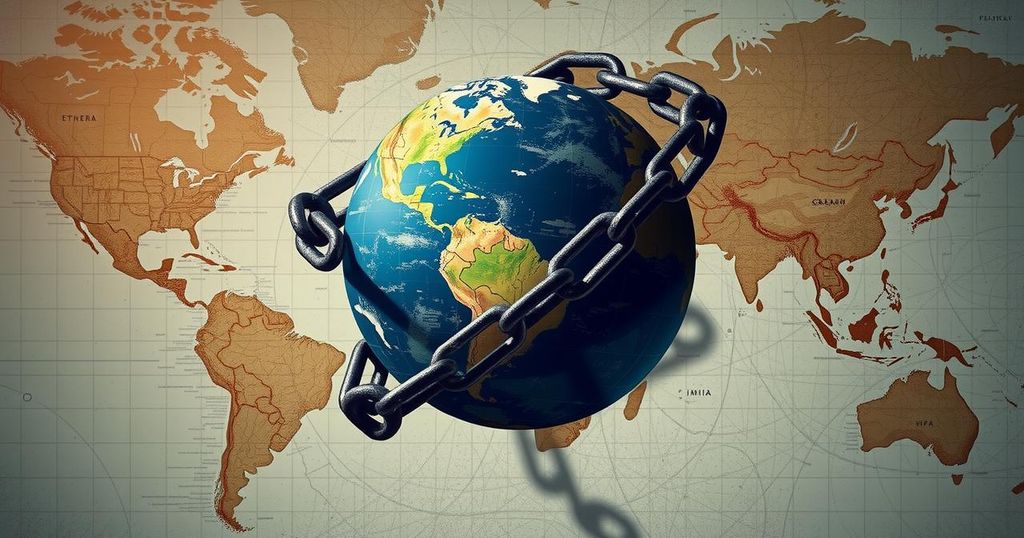On Wednesday, President Trump re-designated Yemen’s Houthis as a ‘foreign terrorist organization’, enforcing stricter sanctions compared to the Biden administration. This decision aims to counter the group’s destabilizing activities in the Red Sea but has raised humanitarian concerns regarding its impact on Yemen’s civilian population and aid efforts. Experts suggest that this move signals a tougher stance towards Iranian proxy forces, although the effectiveness in changing Houthi behavior remains questionable.
On Wednesday, U.S. President Donald Trump officially re-designated Yemen’s Houthi movement, formally known as Ansar Allah, as a “foreign terrorist organization”, as stated by the White House. This re-designation is set to enforce stricter economic sanctions compared to those employed by the Biden administration in response to the group’s assaults on commercial vessels in the Red Sea and U.S. military ships safeguarding this vital maritime route.
Proponents argue that this action is long overdue, although experts express concern that it may adversely affect those providing aid to the Houthis, including various charitable organizations. The White House remarked, “The Houthis’ activities threaten the security of American civilians and personnel in the Middle East, the safety of our closest regional partners, and the stability of global maritime trade.”
The Houthi movement condemned Trump’s decision, asserting it as “unjust” and cautioning about the potential negative economic and humanitarian effects it may have on Yemen. Their main media outlet, al-Masirah TV, reported that the Houthis stated, “The unjust decision against Yemenis further supports the entity’s (Israel’s) crimes against Palestinians.”
Since November 2023, the Houthis, who hold significant control over Yemen, have executed over 100 attacks on vessels in the Red Sea, claiming to act in solidarity with Palestinians amid the ongoing conflict in Gaza. Such attacks have severely disrupted global shipping, necessitating longer, costlier routes for shipping companies.
The Houthis have previously targeted the southern Red Sea and the Gulf of Aden, crucial routes linked by the Bab al-Mandab strait. The Biden administration had attempted to thwart Houthi assaults while periodically conducting military strikes to weaken their combat capabilities, but refrained from targeting their leadership directly.
Initially, President Biden rescinded Trump’s terrorist designations to address humanitarian concerns in Yemen upon taking office in 2021. However, following increased Houthi aggression, he subsequently labeled the group as a “Specially Designated Global Terrorist” organization last year, stopping short of the stricter FTO designation that is now being reinstated.
The British charity Oxfam warned that this new designation will exacerbate the plight of Yemeni civilians by obstructing essential supplies such as food, medicine, and fuel. Scott Paul, Oxfam America’s director of peace and security, stated, “The Trump administration is aware of these consequences but chose to move forward anyway, and will bear responsibility for the hunger and disease that will follow.”
Former Assistant Secretary of State for Near Eastern Affairs David Schenker characterized Trump’s re-designation as a timely response to an Iranian proxy force in the region. He asserted, “While the redesignation likely won’t have a positive impact on the group’s behavior, the measure suggests the new administration is not looking to induce (or cajole) the Iranians to negotiations through blandishment.”
The Trump administration, through this move, aims to collaborate with regional allies to diminish Houthi capabilities and eliminate resources that fund their operations. Additionally, this designation initiates a broad assessment of the U.N. partners and NGOs active in Yemen, as noted by the White House.
In its statement, the administration indicated that USAID will cease relationships with entities found to be financially supporting the Houthis or those overlooking the group’s violence and misconduct. Recently, the Houthis hinted at deescalating hostilities in the Red Sea following a ceasefire agreement between Israel and Hamas, and they have released the crew of a ship initially seized over a year ago.
The U.S. government’s re-designation of Yemen’s Houthis as a foreign terrorist organization is a significant development with profound implications. This action aims to enhance economic sanctions and address the security threats posed by the Houthis in the Middle East. While proponents view the move as necessary, critics warn of its potential humanitarian consequences for the Yemeni population and aid organizations. The geopolitical landscape surrounding the Houthis remains complex, especially in the context of their recent attacks and the ongoing Israeli-Palestinian conflict.
Original Source: www.mtv.com.lb






